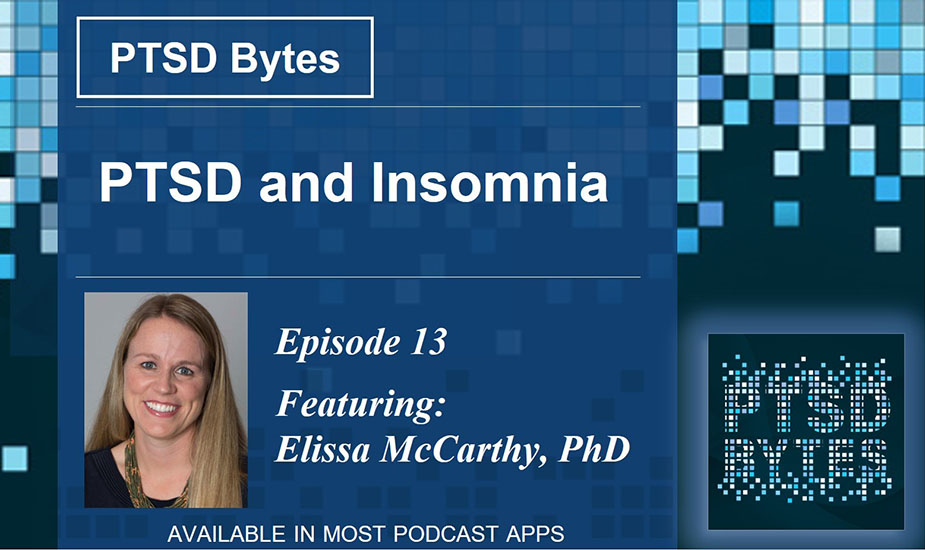Listen to “#13: PTSD and Insomnia” on Spreaker.
In this episode of PTSD Bytes, host Pearl McGee-Vincent discusses Cognitive Behavior Therapy for Insomnia with Elissa McCarthy, a clinical psychologist at the National Center for PTSD at the White River Junction VA in Vermont.
What is CBT-I?
Cognitive Behavioral Therapy for Insomnia, or CBT-I, is the gold standard for insomnia treatments. It is a short treatment, typically lasting around six weekly sessions. The treatment works by educating patients about sleep, which gives them the reasoning behind recommended changes. CBT-I also attempts to address the underlying issues that may prevent sleep and any unhealthy sleep practices.
Effectiveness of CBT-I
While there is not enough information to know exactly who responds best to CBT-I, McCarthy says that most people respond well to the treatment.
Medication does not have the same effectiveness as CBT-I because it does not address the underlying causes of sleep issues.
When to seek help for insomnia
McCarthy recommends talking to your provider if you have concerns about your sleep, especially if you feel that sleep disruptions are having an impact on your life. This can mean feeling unproductive because you’re tired at work or unfocused due to poor sleep.
PTSD and insomnia
Two of the 20 symptoms of PTSD are related to sleep difficulties. Some common sleep issues include nightmares, dreading going to sleep or avoiding sleeping in designated sleeping areas. However, PTSD and insomnia can be two separate disorders that you may have at the same time, and they each may need their own treatment.
Ideally, both PTSD and insomnia are treated at the same time but they can also be treated one at a time.
Seeking help for insomnia
The first step to finding a provider trained in CBT-I may be to reach out to your primary care provider and ask if they know of a trained provider in your area. If you are in VA, you can reach out to any health care provider and ask for a referral for insomnia treatment.
You can also use the internet to find resources. McCarthy recommends the app Insomnia Coach, which allows you to learn about sleep in an easy-to-understand way and provides tips and tools to help with your sleep. The app also allows you to track your sleep and share this information with a health care provider.
Veteran Training Path to Better Sleep is an online course that can also teach you about sleep issues.
Additional links:
- More information about sleep and PTSD on the National Center for PTSD website.
- Society of Behavioral Sleep Medicine therapist directory: https://www.behavioralsleep.org/index.php/united-states-sbsm-members.
- More PTSD Bytes episodes.
If you are a Veteran who is experiencing a crisis or supporting a loved one who is, call 1-800-273-8255 and press 1 for immediate assistance, or chat online at VeteransCrisisLine.net/chat.
Topics in this story
More Stories
VA promotes early nutrition intervention for chronic kidney disease with targeted programs like Heathier Kidneys Through Your Kitchen.
VA Research Advisory Committee on Gulf War Veterans’ Illnesses hosting Veteran Engagement Sessions in Phoenix for 1990-91 Gulf War Veterans.
Navy Veteran and president of the American Medical Association got a colonoscopy and encourages other Veterans to do the same.






